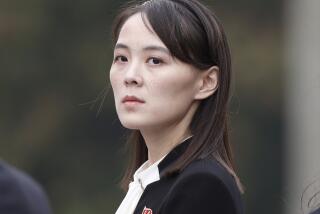N. Korean Says Nuclear Feud Could Spark War : Asia: Pyongyang diplomat denies weapons are in the works. He assails a U.S. call for facility inspections.
- Share via
BEIJING — Disputes concerning nuclear weapons could lead to a new outbreak of war on the Korean Peninsula, Chu Chang Jun, North Korea’s ambassador to China, warned at a press conference here Monday.
Chu sharply protested American pressure on his country to open its nuclear facilities to international inspection. He said Pyongyang would agree to such steps only when Washington and Seoul permitted similar inspections of South Korean sites, including bases where U.S. tactical nuclear weapons have been stored.
He denied that North Korea intends to build nuclear weapons and protested talk in Washington that the United States might consider attacking his country’s nuclear facilities.
“The United States even says it would take military action against our republic,” Chu said. “We regard such sayings as absolutely unpardonable action. That’s why we think that the United States should stop such kinds of actions.”
Some U.S. officials and scholars have indicated in recent weeks that, if diplomatic efforts fail to head off North Korean production of nuclear bombs, a military strike against nuclear weapons production facilities might be considered.
When Defense Secretary Dick Cheney was questioned in Tokyo last week about whether the United States might make a military response if North Korea persisted in its nuclear program, he declined to rule out the possibility. “We have hope that . . . the extent to which the Soviet Union, Japan and others have expressed themselves on the subject offers some cause for optimism,” he said. “I don’t care to speculate beyond that.”
An uneasy truce has been maintained on the Korean Peninsula since the end of the 1950-53 Korean War, when U.S. and South Korean troops fought North Korean and Chinese forces. About 39,000 U.S. troops remain in South Korea. U.S. forces are backed up by tactical nuclear weapons, which Washington has said will be removed soon. And South Korean President Roh Tae Woo said recently that the south will renounce the manufacture, possession or use of nuclear weapons.
The United States believes that North Korea is trying to develop nuclear weapons at a research site in Yongbyon, about 60 miles north of Pyongyang. Washington is pressuring North Korea to open this site to inspection by the International Atomic Energy Agency.
There are enough signs of flexibility on both sides to hold out some possibility for an accord solving the problem. But the chance that diplomacy may fail is prompting growing discussion of a preemptive U.S. attack.
“North Korea’s nuclear facilities at Yongbyon could be destroyed in an air strike,” Francois Heisbourg, director of the International Institute for Strategic Studies, wrote in a commentary Friday in the International Herald Tribune. “But Seoul, less than 35 miles from North Korea, is vulnerable to retaliation. An attack on North Korean nuclear installations could also expose civilians in the area to radioactivity.
“Conversely, if North Korea were allowed to become a nuclear power, in contravention to its commitments as a signatory of the (Nuclear) Non-Proliferation Treaty, then the spread of nuclear weapons in areas of tensions would become the rule rather than the exception,” Heisbourg argued.
Chu stressed Monday that his government wants U.S. nuclear weapons withdrawn from South Korea before it permits inspection of nuclear sites in North Korea, saying: “We are against all kinds of war, including a nuclear war, (breaking) out again in the Korean Peninsula. That’s why we would like to ask for the withdrawal of nuclear weapons from South Korea, nuclear weapons which are the root cause for another war in the Korean Peninsula.”
Until recently, the United States viewed tactical nuclear weapons--in addition to American troops--as a key deterrent to a North Korean attack on the south. But Washington now has announced plans to remove the land-based weapons, while retaining the capacity to defend South Korea with submarine-based nuclear missiles.
Chu charged that Washington’s real intent in demanding nuclear site inspections in North Korea is to undermine Communist rule.
More to Read
Sign up for Essential California
The most important California stories and recommendations in your inbox every morning.
You may occasionally receive promotional content from the Los Angeles Times.













